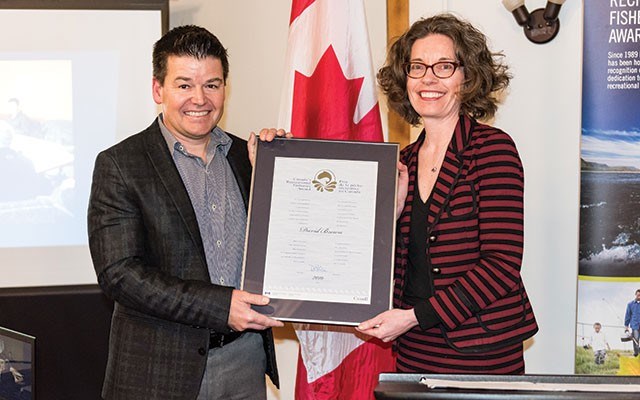The impending elimination of a Fisheries and Oceans Canada (DFO) program that has been vital to the region's salmon habitat has outraged local conservation groups and pushed the Sea to Sky's federal MP to speak out against her own party.
Last week, it was revealed that DFO would phase out its Resource Restoration Unit over the next three years, along with two other components of its Salmonid Enhancement Program, eliminating education and technical support contracts and the production of Steelhead and Cutthroat trout at federal hatcheries.
The move, which came as a shock to both conservationists and elected officials, is a devastating blow to salmon populations in the Squamish River Watershed, and across B.C.
"I feel this is death knell for our Chinook salmon, and a slow and painful death by a thousand cuts for our Coho and Chum stock," said Edith Tobe, executive director of the Squamish River Watershed Society.
Local conservation groups rely heavily on the technical expertise of the restoration unit staff that provides guidance on fish habitat restoration and enhancement projects. By working with the DFO, these largely volunteer-led groups are also able to significantly cut back on costs.
"The department itself... probably comes to the tune of a few hundred thousand dollars of DFO's budget every year. And the return on that investment through staff, in our watershed alone, is about a million dollars a year in restoration activities," explained ZoAnn Morton, executive director of the Pacific Streamkeepers Federation. "So, for the government to say this isn't cost effective and isn't part of their mandate, makes no sense."
The decision to axe the unit, according to a DFO email, came following a recent budget review that determined the federal agency and the Canadian Coast Guard require "ongoing investments to maintain the delivery of critical services to Canadians, such as search and rescue services, the protection of the marine environment, job creation, and various other levels of support that all go towards driving a sustainable maritime economy."
On Wednesday, May 31, Fisheries Minister Dominic LeBlanc announced a five-year, $75-million national Coastal Restoration Fund, which will "support marine habitat restoration priorities and address threats to marine species" on Canada's coasts and waterways.
With the apparent shift in focus away from freshwater to marine habitat, Sea to Sky Fisheries Roundtable member Dave Brown said the DFO is "robbing Peter to pay Paul." "What they're missing here is that without freshwater habitat for salmon to spawn and rear in, those fish don't exist."
There are now four local conservation projects that hang in the balance as a result of last week's discovery, Tobe said, including the restoration of more than 30,000 square metres of salmon habitat that was planned for the Elaho River, northwest of Whistler. Tobe also said her group would now have to consider whether any future restoration projects are possible.
Among the other significant cuts is the elimination of the Salmonids in the Classroom program, which has, for the past 40 years, taught approximately 35,000 B.C. students annually about the life cycle of fish by raising salmon in the classroom.
"This is what (the DFO) keeps saying: That they want to get into small, coastal communities, and that they want to work with volunteers, and this is not the way to show it," said Morton.
Pamela Goldsmith-Jones, Liberal MP for the Sea to Sky, called the cuts "antithetical to why I would even consider running for member of parliament," and vowed to work on getting the eliminated programs "back on track."
What remained unclear at press time was whether Wednesday's funding announcement would include resources for the local salmon projects that are now in jeopardy without the Resource Restoration Unit in place.
Goldsmith-Jones, who said she found out about last week's program cuts from local media, apologized on behalf of her party for how the situation was handled.
"This has obviously introduced incredible uncertainty and instability in our communities, and for that I'm deeply sorry," she said. "It's certainly nothing I support, and I've been upfront with the minister about that, and the minister agrees with me. So we will address this. I'm hopeful this announcement (May 31) will help."
The confusion around the elimination of the restoration unit — only to be followed by a significant funding announcement days later — is more proof of the "complete incompetence" rampant at the DFO and in Ottawa, Brown believes.
"It's the bureaucrats that were there under (former Prime Minister Stephen) Harper that are still driving the ship," he said. "These decisions are coming from senior political advisors."
The program cuts were reportedly leaked by DFO employees, according to sources familiar with the situation.
For Tobe, the political doublespeak from the Liberals has disillusioned her from a party that made numerous promises on fisheries management — most importantly, on following the recommendations of the landmark 2012 Cohen Inquiry into the decline of Sockeye salmon — that she feels it has yet to fulfill.
"I was a big supporter of the Liberal Party and the Pamela Goldsmith-Jones campaign, and I feel this government, the Trudeau government, has just picked up where Stephen Harper left off, and has actually even brought us further back to the 1960s and '70s. It's completely contrary to what this government made promises to do," she said.
"At least Harper was honest about having no interest in science. This government says everything they're doing is based on science, when everything they're doing couldn't be further from the truth.
"Seeing the writing on the wall, it's very, very clear to me that this government has no interest in maintaining, assisting and preserving our Pacific wild salmon stocks."




